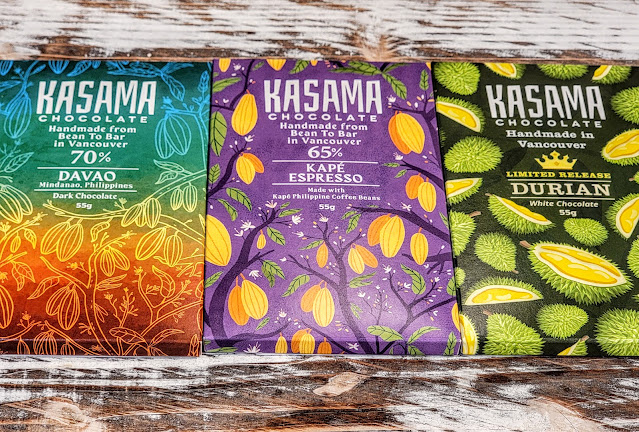Chocolate can be an environmental and ethical disaster when produced by "big chocolate" (sorry to coin an expression if no one else has yet, but like other commodities, when giant companies get involved, greed often wins out over everything). On the other hand, if it is produced by small and connected groups of people, it can be part of an environmentally friendly and ethical industry. The cacao trees themselves are shade trees and in the Philippines are generally grown in companionship with other crops like bananas or coconuts and so provide an environmentally friendly crop. Unfortunately, we usually hear about the Amazon or African rainforests being cut down to produce a mono-crop, which does not need to be the case. Discussion of the treatment of the farm workers in those mono-crop situations is another equally important issue for another time.
Within a few days, I heard Richard Wolacks's interview with Vince (one of 4 partners at Kasama Chocolates and the Philippine connection that got their enterprise started) on the Vanfoodster podcast and an interview with Rowan Jacobsen about the ethics of chocolate on the podcast Climavores. Armed with all that newfound and dangerous knowledge, I was thrilled to see that Kasama would be participating in the Greater Vancouver Hot Chocolate Festival and that their offerings would be vegan! I love it when a plan comes together and this wasn't even a plan!

Kasama is located at the east end of Granville Island (near the G.I. Hotel) and we went on Sunday morning, intent on learning about their product and tasting their hot chocolate offerings.

It is clear that Kasama has a base of enthusiastic fans as many opinions were offered as we browsed and tried the Continents Dark Chocolate, a mixture of chocolates from 3 continents. On the side were samples of each of the 3 chocolates. We are not any more chocolate experts than we are wine experts, but this drink was complex and rich. According to the description, we should have been sensing pears and berries but I was too busy sighing deeply to pick that up.

The Brazo de Mercedes is purple thanks to ube, (purple yam) but included other Filipino ingredients such as pandan (young coconut) and calamansi meringue. Served with an Ube Shortbread Cookie (they were good enough to let me know that the cookie was not vegan) it was again a warming experience that made us very happy.

This is where the opinions of the regulars became useful as everyone declared the Durian White Chocolate to be their favourite. They had sold out previously but Vince had been working on a batch in the back as we were arriving! He gave us a taste which we loved, and we waited 5 minutes for him to start wrapping them up! Unfortunately, I let up on the gas pedal just for a moment and forgot to check the ingredients. The Durian W.C. is not vegan even though the other dark chocolate bars that we bought are vegan. I am not afraid of burning in hell for eating dairy when tasting the sample but I will pass the rest of the bar along to someone who can appreciate it and has no objection to dairy. The other 2 bars are amazing b.t.w. I am thrilled by the taste of espresso in the Kape Espresso bar.

Vince was kind enough also, to take a few minutes to talk to us about the operation and he and my wife compared family farms in the Philippines. Could growing ube and cacao in the Philippines become our retirement project someday?
The front area of Kasama is hung with pictures of farming cacao in the Philippines, among other things and displays and descriptions of their exceptional product. There are no tables and this is not meant to be an eatery. There are a few chairs and we did drink our hot chocolate while talking and browsing. You need to look Kasama up if you are a chocoholic for sure and if you are interested in the ethical treatment of the people that bring the product to this market.
Food 5 out of 5
Vegan Options 4 out of 5
Value 5 out of 5









No comments:
Post a Comment